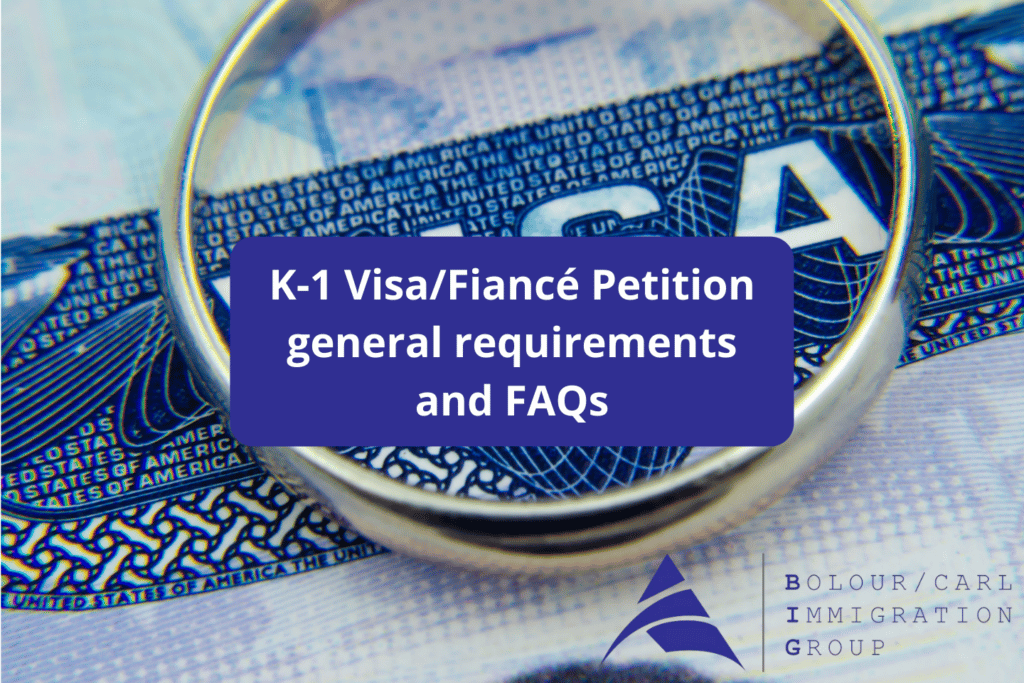
A K-1 fiancé visa is a type of nonimmigrant visa that allows a foreign national to enter the United States to marry a U.S. citizen. After the wedding, which must take place within 90 days of arrival, the foreign national can apply for a marriage-based green card.
Below are some frequently asked questions about fiancé visa eligibility requirements and application procedures.
Who is eligible for a fiancé visa?
A K-1 fiancé visa is for foreign nationals who plan to enter into a legitimate marriage with a U.S. citizen. Both parties must be able to show that they are free to legally marry in the U.S., and they are required in most cases to have met in-person at least once within the two-year period prior to the initial application. Further, the U.S. citizen fiancé’s earnings must be at or above the Federal Poverty Level (there are no specified income requirements for the foreign fiancé). Same-sex couples are eligible for fiancé visas regardless of the marriage equality laws in the foreign national fiancé’s country.
How do you apply for a fiancé visa?
The fiancé visa application process includes four steps, which are outlined below.
Step One: File Form I-129F
The U.S. citizen fiancé must first file Form I-129F, Petition for Alien Fiancé(e), with U.S. Citizenship and Immigration Services (USCIS). In addition to conducting background checks on both parties and verifying that the sponsoring fiancé is actually a U.S. citizen, USCIS will check that both fiancés are legally free to marry. If either of you was previously married, you must submit proof that the marriage was legally terminated by divorce, annulment or death.
USCIS will also review your application to determine if the relationship is bona fide. You must demonstrate your intent to establish a life together, which must include sworn statements from both of you about your relationship and plans to marry. You must also submit proof that you met in person at least once within the prior two years. A waiver of the in-person meeting requirement can be requested if the meeting would have violated strict, long-established culture-based customs or if it would have resulted in extreme hardship to the U.S. citizen fiancé.
You should also include additional information demonstrating that your relationship is bona fide, such as photos together, itineraries and receipts from trips you took to visit each other, letters and emails that you sent to each other, and written statements from friends and family members about your relationship and engagement. The more evidence you provide, the better, and working with an immigration law firm with expertise in fiancé visas can help ensure that a strong, thorough application is submitted to avoid unnecessary delays or a denial.
The filing fee for Form I-129 is $535. USCIS will send you a receipt notice within 30 days of receiving your application. It typically takes about six to 12 months for USCIS to process an I-129F application.
Step 2: File Form DS-160
Once USCIS approves your Form I-129F petition, your case will be transferred to the U.S. Department of State’s National Visa Center (NVC). As the foreign national fiancé, you will be contacted by the NVC with the date of your visa interview and instructions to complete Form DS-160, Online Nonimmigrant Visa Application, online and print the confirmation page. You will bring this page to your visa interview, along with certain other documents, including an affidavit of support (Form I-134) from your U.S. citizen fiancé promising to use his or her resources to prevent you from relying on government benefits, along with his or her most recent tax return(s).
As the foreign national fiancé, you must submit police clearance from all countries where you have lived for more than six months since you were 16 years old and a medical exam form, among other documents. You will also bring the packet of evidence of your relationship and intent to marry from the completed Form 1-129F packet.
Step 3: Attend your visa interview
As the foreign national fiancé, you must attend your visa interview, which typically takes place in the U.S. embassy in your home country about four to six weeks after receiving your notice. Bring all of the required evidence to the interview and pay the $265 visa fee. A decision about your case is usually made the same day as the interview.
Step 4: Come to the U.S. and get married
You will be given a sealed visa packet, which you must present unopened to the U.S. Customs and Border Protection agent upon your arrival in the U.S. You must enter the U.S. within four months of the date your visa is approved, and the wedding must take place within 90 days of your entry into the U.S.
If you fail to marry your sponsoring fiancé in this timeframe, you will lose your K-1 visa status. If you decide not to go through with the marriage, you are ineligible to stay in the U.S. A K-1 visa cannot be changed to any other status except a marriage-based conditional permanent resident (with the same sponsoring U.S. citizen).
After you get married, you can apply for your marriage-based green card by filing Form I-485, Application to Register Permanent Residence or Adjust Status.
Can a K-1 fiancé visa holder work?
Yes. Once you have entered the U.S., you can immediately apply for work authorization by filing Form I-765, Application for Employment Authorization. This work authorization is only valid for 90 days, however. You can also apply for work authorization at the same time that you apply for your marriage-based green card.
What if a K-1 fiancé visa holder has children?
If the foreign national fiancé has children who are under age 21 and unmarried, they can be included in the application and brought to the U.S. with a K-2 visa either with or after their parent. After the wedding, the children may apply for green cards along with their parent.
Can a Form I-129F be filed from outside the U.S.?
No, it must be filed by the U.S. citizen fiancé from inside the U.S.
How can the status of a Form I-129 application be checked?
You can check the status of your application using the 13-character case number that USCIS assigned to you upon receipt of your application.
What if the application is denied?
If USCIS denies your K-1 visa petition, you are permitted to file a timely appeal. It is advisable that you contact an experienced immigration attorney prior to filing your appeal to review your options.
If you would like to speak to a fiancé visa lawyer, contact Bolour/Carl Immigration Group at 323-857-0034 or [email protected].




